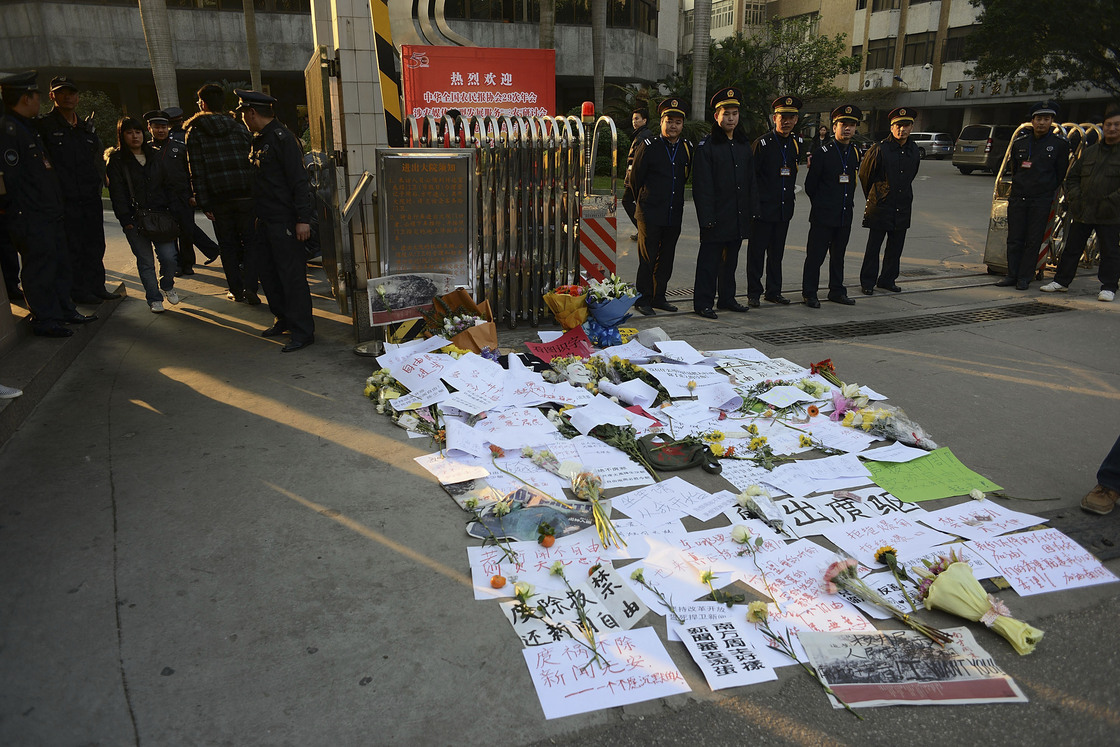Security guards stand outside newspaper offices in Guangdong province in January, where banners and flowers were laid in protest of censorship.
AP Security guards stand outside newspaper offices in Guangdong province in January, where banners and flowers were laid in protest of censorship.AP
Security guards stand outside newspaper offices in Guangdong province in January, where banners and flowers were laid in protest of censorship.AP Thousands of messages posted on the Internet every day in China get censored. Until now, little has been known about how the Chinese censorship machine works — except that it is comprehensive.
"It probably is the largest effort ever to selectively censor human expression," says Harvard University social scientist Gary King. "They don't censor everything. There are millions of Chinese [who] talk about millions of things. But the effort to prune the Internet of certain kinds of information is unprecedented."
King has just completed two studies that peer into the Chinese censorship machine — including a field experiment within China that was conducted with extraordinary secrecy. Together, the studies refute popular intuitions about what Chinese censors are after.
The censors actually permit "vitriolic criticism" of China's leaders and governmental policies, King and his colleagues — Jennifer Pan and Margaret Roberts — found. But the censors crack down heavily on any move to get people physically mobilized to act on such criticism.
"What they're after is any attempt to move people," King says. "Any attempt to [motivate] collective action."
Susan Shirk, an expert on China at the University of California, San Diego, praised the rigor of the studies. The results also mesh perfectly, she says, with the notion that Chinese leaders desperately wish to head off another uprising along the lines of the 1989 protest at Tiananmen Square.
In an authoritarian state, Shirk says, leaders are often unsure about public sentiment, because there are no elections or public opinion polls to gauge popular views about issues. Allowing criticism, she explains, is actually a smart, intelligence-gathering move: Should people protest against a local official, for example, top leaders monitoring the criticism could have the official removed, leading to greater faith in the regime.
King offered a couple of examples of how the censors work: A Chinese mother once protested a local official outside his hotel. Her demonstration led to sympathetic outrage on social media sites, but the action was almost entirely online — and that flurry of posts went uncensored, King said.
By contrast, after an earthquake damaged nuclear reactors in Japan, there was a run on salt in China, King says, because people believed — wrongly — that eating salt could protect them against disorders linked to radiation. People physically mobilized around the issue, and media posts that cataloged these activities were quickly censored, King said, because the online commentary corresponded to a physical, public presence.
King also looked at messages with a pro- or anti-government tilt that attempted to mobilize people: "If ... you say, 'Hey, let's go protest,' and have a whole bunch of people march on some government office, it will be censored," he says. "But at the same time, if you say, 'Let's have a big party for all the government officials who are doing such a great job,' and you are also able to move people, you will also be censored."
The reason, King says, is that people with the capacity to generate turnout for a pro-government rally might one day rally people for anti-government protests.
King's first study analyzed millions of posts across hundreds of Chinese websites. The second study, not yet published but recently presented at the American Political Science Association meeting in Chicago, described field experiments conducted inside China. King and his colleagues posted messages on the most popular social media sites and monitored the sites to see which posts got censored.
The researchers also created their own media site within China, and received explicit instructions from authorities about what material needed to be taken down.
"If you actually make it impossible for people to learn about collective action events," King says, "if you make it impossible for people to learn about protest events, then people outside the government don't have the ability to move other people and [the leaders] can protect the regime much more."
No comments:
Post a Comment